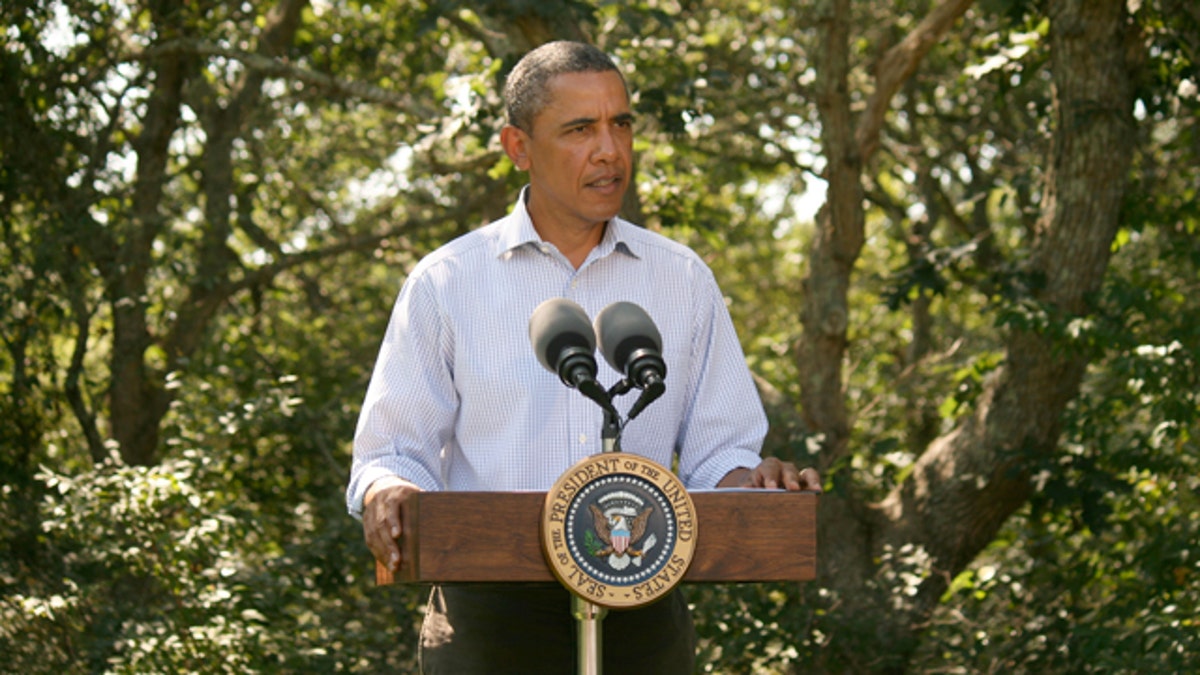
President Obama delivers a statement on Hurricane Irene in Martha's Vineyard Aug. 26. (White House Travel Pool)
President Obama's been blaming "bad luck" lately for the state of the economy. Then along comes Hurricane Irene.
The storm that already has lashed the Bahamas was making its way toward the North Carolina coast Friday. Thousands of people were under evacuation orders as governors all along the East Coast declared a state of emergency.
The potential effect from natural disasters like this is a mixed bag. They can cause billions in property damage, sap up government resources, trigger a rise in gas prices and cut down on productivity in the near-term. Irene's bill may be inflated by its presumed landfall along the East Coast, where property values are high.
At the same time, the effects of hurricanes tend to be localized and not big enough to choke the national economy. Any drop-off from the immediate damage can also be offset later by the burst of spending on construction and relief efforts. Plus Irene has been downgraded to a Category 2 and is tracking a bit east of New York City -- a good sign.
Nevertheless, the storm and its aftermath pose another mess for Obama and Congress to deal with at a time when the administration is looking to roll out a new jobs plan for the nation. Money and time spent on storm recovery is money and time the federal government doesn't have for new economic proposals.
Obama, delivering a brief statement on the hurricane from Martha's Vineyard, where he is vacationing, made clear Friday that Washington would bring "all federal resources to bear."
He also urged residents to take all possible precautions and evacuate if instructed, taking care not to downplay the potential impact.
"We all hope for the best, but we have to be prepared for the worst," Obama said. "All indications point to this being a historic hurricane."
The administration has lamented the toll natural disasters and other events have had on the economy. Ahead of the hurricane's landfall, outgoing Obama economic adviser Austan Goolsbee cautioned on Fox News that the economy remains vulnerable.
"At the beginning of this year, we get earthquakes, tsunamis, revolutions in the Middle East, European financial crises -- now they even got earthquakes outside of Washington, D.C.," he said. "I mean we've had a series of things that have ... slowed the economy back down again."
Pat Michaels, a senior fellow in environmental studies at the Cato Institute, said the storm will likely inflict significant damage on the North Carolina coast and Jersey shore. But he said the current track should not result in economic calamity.
"If this were Bangladesh you would notice it, but in economic numbers this thing is going to be worth a couple of tenths of something," he said.
Michaels said that even though the hurricane will cost homeowners, the subsequent repairs are a sort of "shovel-ready" project that can help the economy.
The impact depends in large part on where the storm goes and whether it intensifies.
Homeland Security Secretary Janet Napolitano said that while the storm was downgraded, those in its path "won't be able to tell much difference."
Bill Read, director of the National Hurricane Center, warned that heavy rains will not only increase the risk of flash flooding, but make trees more susceptible to high winds, bringing them down "more readily" than if the ground were dry.
FEMA Administrator Craig Fugate warned that power outages could last a week or longer in some spots.
Max Mayfield, former director of The Hurricane Center, also told The Associated Press that a major hurricane going up the Northeast coast is "one of my greatest nightmares," predicting billions of dollars in damage and an impact on the U.S. economy.
According to analysis conducted by the company CoreLogic, nearly 1.9 million properties are at "potential risk" of storm-surge flooding in the major metro areas in the storm's path.
The costliest storm in recent history was Katrina, which did $125 billion in damage in 2011 dollars. Hurricane Ike in 2008 caused $31 billion in damage, while Andrew in 1992 caused $43 billion.
One Labor Department study found that in the aftermath of Katrina, New Orleans recorded nearly $3 billion in lost wages in the 10 months following the storm -- though Katrina was unique in that the associated flooding caused far more damage than the storm.
A Congressional Research Service report from 2005 that examined the economic impact of that and other storms noted that the assumption is hurricanes have a "limited and temporary" effect on growth.




